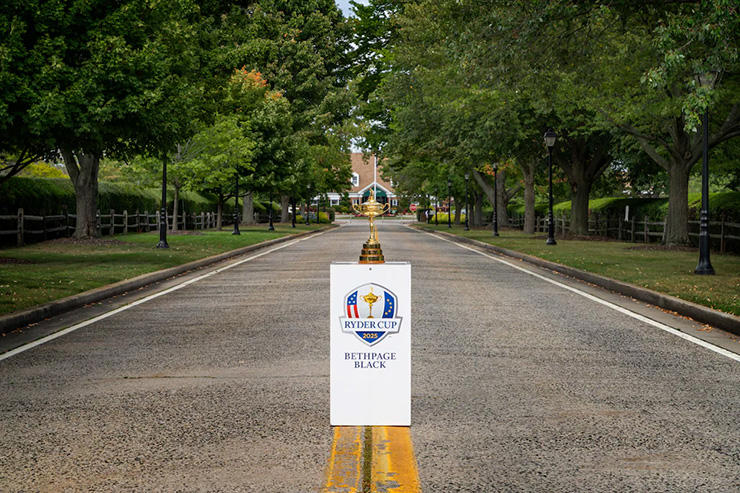
The Ryder Cup is often described as golf`s most electric event, a biennial clash where individual talent morphs into fierce team loyalty. Yet, at Bethpage Black in Farmingdale, New York, during the 2025 competition, that electricity surged well beyond the fairways, transforming into a charged atmosphere that tested the very fabric of sportsmanship. What unfolded, particularly for European stalwarts Rory McIlroy and Shane Lowry, was a stark reminder that the line between passionate support and outright hostility can be surprisingly thin.
The Crucible of Bethpage: A Predetermined Roar
From the moment Bethpage Black was announced as the host venue, there was an unspoken expectation: this would not be a polite golf tournament. Bethpage, a public course known for its notoriously vocal and unreserved New York galleries, promised a Ryder Cup experience unlike any other. The “Bethpage Roar” was anticipated, a natural extension of the fervent local sports culture. What few predicted, however, was the extent to which this roar would morph into a sustained barrage of personal taunts and deliberate disruptions, aimed squarely at the visiting European contingent.

When the Cheers Turn to Jeers: A Targeted Onslaught
Saturday’s four-ball match, pitting Europe’s dynamic duo of McIlroy and Lowry against American hopefuls Justin Thomas and Cameron Young, became the epicenter of this tumultuous atmosphere. As Europe`s lead grew, so too did the intensity of the crowd`s vocal aggression. This wasn`t merely good-natured banter; it was a calculated campaign of psychological warfare. Players were heckled during their pre-shot routines, putts were accompanied by shouts, and the insults escalated from generic “F— you, Rory” to deeply personal attacks concerning past major losses, alleged “fluke” wins, and even their private lives and marriages. Lowry, too, bore the brunt, with comments targeting his weight and perceived lack of contribution.
McIlroy, a man known for his composure under pressure, found his patience frayed. A televised “Shut the f— up!” during foursomes earlier in the day served as a raw, unfiltered glimpse into the strain. “I don`t mind them having a go at us… that`s what an away Ryder Cup is,” McIlroy conceded, “Whenever they are still doing it while you are over the ball and trying to hit your shot, that`s the tough thing.” This highlights the critical distinction: passion is one thing, deliberate sabotage of an opponent`s focus is quite another.
The Line in the Sand: Security and Sportsmanship
The escalating situation necessitated a visible increase in security, with New York State Police troopers lining the ropes and Bethpage State Park Police on bikes monitoring galleries. Despite these efforts, the noise persisted, leading to confirmed fan ejections. This raised uncomfortable questions about the boundaries of fan behavior in competitive sports. The PGA of America acknowledged the issue, promising to “closely monitor fan behavior and take appropriate action,” a statement that, while necessary, underscored the regrettable reality of the day.
An intriguing subplot emerged with American player Justin Thomas, who, while attempting to calm sections of the crowd, was observed by European player Robert MacIntyre as potentially “gearing them up” moments before. This duality speaks volumes about the inherent tension of a partisan crowd: are players simply leveraging the home advantage, or do they have a responsibility to temper excessive zeal?
The Emotional Toll and the Unbreakable Spirit
For McIlroy, the day was “difficult” and left him “drained.” Yet, in true Ryder Cup fashion, the emotional turmoil fueled a defiant spark. His explosive celebration on the 14th hole, after sinking a crucial birdie putt, was a cathartic release. Fist-pumping and yelling “Come on! Come the f— on!” directly at the grandstands, McIlroy’s raw display was a testament to the immense psychological pressure and the primal satisfaction of overcoming adversity.
Shane Lowry, despite the personal insults, found a unique energy in the chaos. “It was intense. It was like something I`ve never experienced,” he stated, adding, “This is what I live for. This is it. This is, like, honestly, the reason I get up in the morning, for stuff like this.” This dichotomy – exhaustion for one, exhilaration for another – showcases the diverse mental fortitude required to thrive in such a high-stakes, high-decibel environment.
A Captain`s Perspective and a Lingering Question
U.S. Captain Keegan Bradley offered a nuanced view, attributing some of the crowd`s anger to the American team`s underperformance. “Their home team is getting beat bad… part of it our fault. We are not playing up to the standards that they want to see, and they are angry, and they should be,” he observed. While acknowledging that “you`re always going to have a few people that cross the line,” his comments implicitly suggest that fan behavior, however boisterous, is also a reflection of the contest itself.
The Ryder Cup at Bethpage Black will undoubtedly be remembered for its results, with Europe holding a historic lead. But it will also be etched into memory as a contentious chapter in the lore of golf`s premier team event. It forces us to ask: when does the spirit of competition give way to something less honorable? And how will this experience shape future Ryder Cups, ensuring that the passion remains, but the partisanship finds its appropriate boundaries? The debate, much like the Bethpage roar, is likely to echo for years to come.











